Soledad O’Brien Praises Mercado Global at Event in New York
On Tuesday September 29th we hosted an event, in collaboration with the women’s network 85 Broads, to benefit our Artisan Training Program in Guatemala. Our friends at Halvai Gallery in the SoHo neighborhood in New York provided us with a fantastic space to host the event. Around 200 of our supporters were there to support our work and enjoy the world’s best rum, Ron Zacapa, which is, of course, from Guatemala.
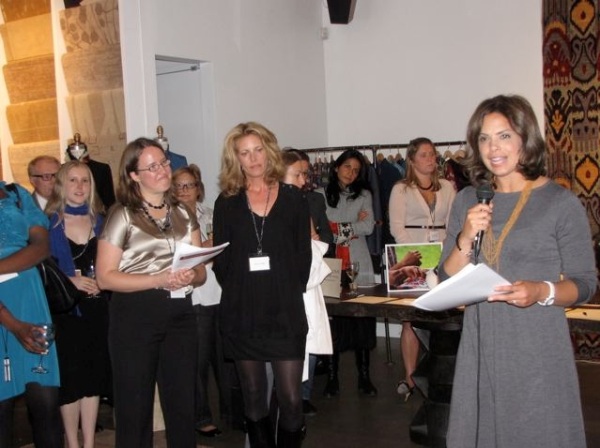
Soledad O'Brien (right) speaking at event in New York.
The event featured a silent auction of pieces from our Holiday 2009 collection and the debut of the photos from our Role Model photo shoots. We were very excited to have Soledad O’Brien, host of CNN’s Special Investigations Unit, speak in support of our work and honor our Role Models and women all over the world who strive to make change in their communities. It was such an exciting and moving evening!
All the proceeds from the event will help fund our Artisan Training Program. The training program helps us introduce our model to new communities throughout the Guatemalan highlands. This program is so important because it provides our new partner artisans and cooperatives with the financial literacy, business administration, and technical training to take full advantage of the opportunities given to them by participating in our sales program. It also helps us accommodate the increasing interst in our work and the beautiful work of our artisans, ensuring that fair trade products are more accessible to everyone!
Thank you to Halvai, Mktg, Diageo, Twelve, Pure Dark, Café Bocca, Beauty is Global, and Joe Tanis Photography for all their help in making the evening a success. If you missed the event you can check out a photo gallery by clicking here.
Meet Our Team in Guatemala: Marisol Morales
Beginning this month, Mercado Global, with the generous financial support of the Levi Strauss Foundation, will be implementing a Micro-Credit and Matched Savings Program. Through the program, we expect to further advance our mission to provide our partner artisans with healthy and sustainable sources of income. This morning I sat down with Marisol Morales, who has been brought in to help train our partner artisans about the ins and outs of the program, and asked her about her life and what she hopes to accomplish with Mercado Global.
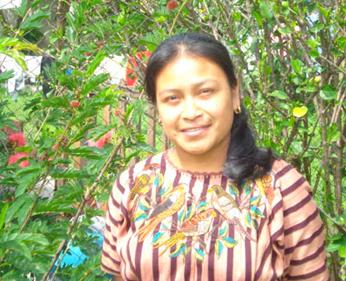
Marisol is from the village of Panimatzalam (say it slowly: Pan-eem-atz-ah-lam) in the municipality of San Andrés Semetabaj, in the department of Sololá. She grew up with three brothers and two sisters near the banks of Lake Atitlán, which Aldous Huxley famously regarded as “the most beautiful lake in the world.” Her first language was K’iche’, one of between twenty-one and twenty-four (depending on who you ask, although the Guatemalan government officially recognized twenty-one as part of the 1996 peace agreement) Mayan languages spoken in Guatemala. She tried teaching me a few words in K’iche’, but one must have far more agile vocal chords than mine to speak that language (it’s very throaty). Needless to say, Marisol found my efforts at communication in her native tongue to be quite amusing.
Marisol also speaks Spanish, but she didn’t start learning it in school until she was six. She says that while most people from her community, especially the younger generation, can speak Spanish, K’iche’ is spoken exclusively in the home. She also knows a little bit of English, but says she would like to learn more. We always have at least a few English-speaking volunteers in the office, and she’d like to be able to understand them (we have arranged for a weekly English lesson).
Marisol has worked extensively as a community organizer in Guatemala’s highlands. Educated in Agroecoturismo (more or less Agroecotourism), Marisol has worked to conserve Guatemala’s environment in order to maintain her country’s natural beauty while helping the economy by promoting tourism. She has also helped women’s cooperatives build solidarity and work together as a unit, encouraging them to reinvest in the community. When I asked her why she wants to work for Mercado Global, she said, “Mercado Global has a vision to help people, to give them a fair price for the things they make. I believe my skills can help with this situation.”
She also said she thinks it’s a very nice environment to work in, with lots of different types of people from whom to learn and with whom to share. I’m glad she thinks so. We’re happy to have her here, too.
Role-Modeling with 85 Broads
85 Broads is a global network of 20,000 women who are empowered, inspired, and connected. Its members are located in 82 countries around the world and work for thousands of fantastic organizations. We at Mercado Global are so pleased that the women of 85 Broads gave up some of their valuable time to put themselves in front of the camera to model a selection of pieces from our Spring 2010 Collection in a “Role Model” photo shoot.
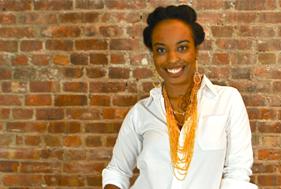
Regina Martinez, who is working as a 2nd chef in order to pay for Fall semester at F.I.T., above, wearing mustard drop earrings and a 14 strand necklace in gold from our Spring 2010 collection.
This was the second time that members of 85 Broads have modeled our pieces in a photo shoot (the first time was in ’06). These photographs were taken at In Good Company Workplaces on August 25th, 2009. The experience was a real pleasure for everyone involved. Joanna Glovinsky, our Production Manager who lives and works in Guatemala and who helped out with the photo shoot, said, “I had a great time getting to meet all these inspiring women – women who have the power to empower. It made me proud to work for an organization like Mercado Global.”
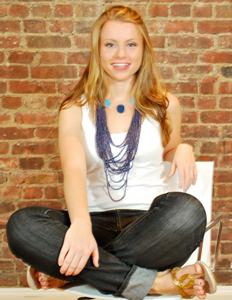
Liya Shuster of 85 Broads.
After the photo shoot, we asked the members of 85 to respond to a questionnaire about their life stories and the things that inspire them. Liya Shuster, pictured above in a 14 strand necklace in plum and a ceramic collar necklace in blue from our Spring 2010 collection, told us that she emigrated from Baku, Azerbaijan when she was eighteen months old as a Jewish political refugee. She didn’t learn English until she was 6, “through PBS and Nickelodeon,” she said. As a child, she attended inner-city public school in Queens. Liya is now a senior at Dartmouth College studying International Relations and Economic Geography. We asked her to tell us who was her role model that put her on the path she is on now. “My parents,” she said. “Their hard work and perseverance were the perfect example of how to lead life with integrity.”
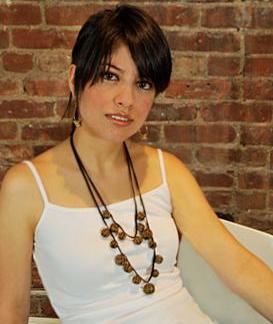
Natalia Oberti Noguera of 85 Broads.
Natalia Oberti Noguera, pictured above wearing gold earrings and a necklace from our Spring 2010 collection, is currently the director of New York Women Social Entrepreneurs (NYWSE), a group that provides a network for young women social entrepreneurs from New York who support, encourage, and propel each other. When asked what her greatest inspiration is, Natalia said, “Stories of people fighting to make the world better inspire me.”
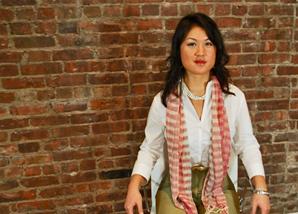
Stephanie Chin, above, wearing a multi-strand necklace in white turquoise and gold and a Deco weave scarf in oranges, both from our Spring 2010 collection.
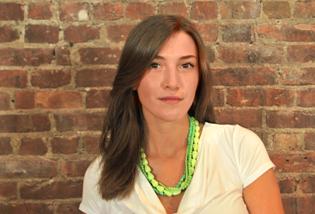
Meredith Hanson, a full time student about to begin her junior year at Wheaton College above, wearing a multi-strand necklace in green turquoise from our Spring 2010 collection.
Partnering with a great organization like 85 Broads reminds us of the potential of our partner artisans and their children when they are given the opportunity to succeed. Working with our artisans in Guatemala, I get to see first-hand the enthusiasm they have for their new work opportunities. Now that every one of their primary school-aged children is in school, our partner artisans and their families have hope in the promise of a better future.
Thanks again to 85 Broads for their support and encouragement!
5 Reasons Why We Are Succeeding
Each year, towards the end of the summer, Mercado Global completes its annual Social Impact Survey to better understand the areas in which we are succeeding and where we need to improve. This year, the results of the study indicated some extremely encouraging results in a variety of areas, including savings, financial literacy, education, health, community partnership and leadership. After looking over the survey, I picked out five indications of our success that really jumped out at me:
1. Improved Empowerment and Leadership Skills
Our partner artisans are women who have survived decades of civil war, who have raised their children as single mothers because their husbands either immigrated to the United States or were killed during the war, and who have managed not only to endure these hardships but to prevail by cultivating incredible artistic abilities. With these kinds of accomplishments, these women have the right to be respected and especially to respect themselves. It is with this knowledge in mind that we focus so much of our efforts on providing leadership opportunities to women so that they can gain self confidence and empowerment to benefit themselves, their families, and their communities.
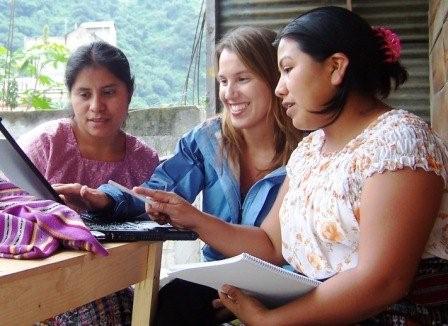
In Mercado Global’s 2009 Social Impact Survey, our partner artisans’ reports of their feelings about leadership and community involvement were encouraging. In 2009, a majority of our partner artisans had a leadership position within their community in the past 12 months. In 2008, this figure was 31.7%. Moreover, in 2009, 70% of artisans said they would like to be part of the next leadership term in their groups. In 2008, this statistic was 60.9%. It is fantastic to know that more and more of our partner artisans are acquiring the confidence to lead.
2. Installation of Cement Floors
This PDF from Habitat for Humanity discusses the serious problems that arise from having dirt floors in the home. Among these problems are that dirt floors that get wet during Guatemala’s six month rainy season often stay wet throughout the duration of the rainy season, making the home cold and uncomfortable for the family inside. During the other half of the year, dirt floors can get so dry that the house is constantly dusty, causing pulmonary problems for members of the family. Dirt floors are also not washable, which can cause members of a family to get sick, especially the children. The Habitat for Humanity report included an interview with the principal of a highland school on this issue:
Damian Lopez, the principal of a village school in the Guatemalan highlands, estimates that 200-300 people in the area around his village die each year from illnesses they get from parasites. “Most of the people who die are young children,” he says. “When someone walks into a house, their shoes might transport parasites onto the floor. It is easy for little children playing on the floor to get exposed to these parasites.”
In 2008, a majority of our partner artisans reported that they had dirt floors in their homes. Within the past year, however, an overwhelming majority of our partner artisans earned enough money to install cement floors. Installation of cement floors not only improves the comfort and health of families. When children are sick less, they miss less school, and their grades improve. Likewise, when adults are sick less, they are able to earn more money to support their families and communities.
3. Increased Savings
Savings serve as insurance for unforeseen disasters and help accumulate capital to invest in the future. Prior to working with Mercado Global, savings were unheard of in our partner artisans’ communities. Now that they are earning more money, Mercado Global emphasizes the importance of savings, accumulating assets, and investing within the cooperative as the best strategy to prepare for unforeseen setbacks. With the help of the Levi Strauss Foundation, we will soon be implementing a matched savings program.
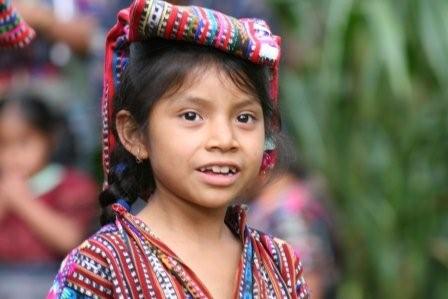
Our effort to encourage saving earnings has produced fantastic outcomes. In 2009, our partner cooperatives reported saving an average of Q927, which improved from an average of Q375 in 2008. Moreover, our Social Impact Assessment for 2009 suggests increases in our partner artisans’ levels of financial literacy. 96% of the artisans participate at least a little in the finances of their households. This significantly increased from 75.6% in 2008.
4. Greater Access to Electricity and Water
Increased family income through Mercado Global sales has significantly decreased poverty indicators for our artisans’ families, specifically access to electricity and potable water. According to the World Bank, only 50% of indigenous Guatemalans living in rural areas have access to electricity. In our 2009 Social Impact Survey, 98% of our partner artisans reported having electricity in their homes. Moreover, in a country in which approximately 28% of the general population lacks access to potable water, only 8% of our partner artisans reported lacking access to potable water, which decreased from 15.9% in 2008.
5. Bigger Homes
Rural Guatemalans often have to live with several family members in very small homes. This decreases overall comfort and increases susceptibility to disease. Last year, our partner artisans’ homes contained an average of two rooms. In 2009, due to increased earnings from sales through Mercado Global, our partner artisans and their families are living in bigger homes, which contain an average of between three and four rooms.
Ultimately, while 2009’s Social Impact Survey provided a great deal of encouraging indicators concerning the success of our efforts, it also reminded us that we have to keep up our efforts to achieve our goals.






 Follow us on Twitter
Follow us on Twitter Join us on Facebook
Join us on Facebook Sign up for Mailing List
Sign up for Mailing List